150 Best Socratic Questioning Quotes: Ignite Curiosity and Critical Thinking
Ever feel like a simple question can unlock a whole new level of understanding? That’s the power of Socratic questioning, a method used for centuries to stimulate critical thinking and illuminate underlying presumptions.
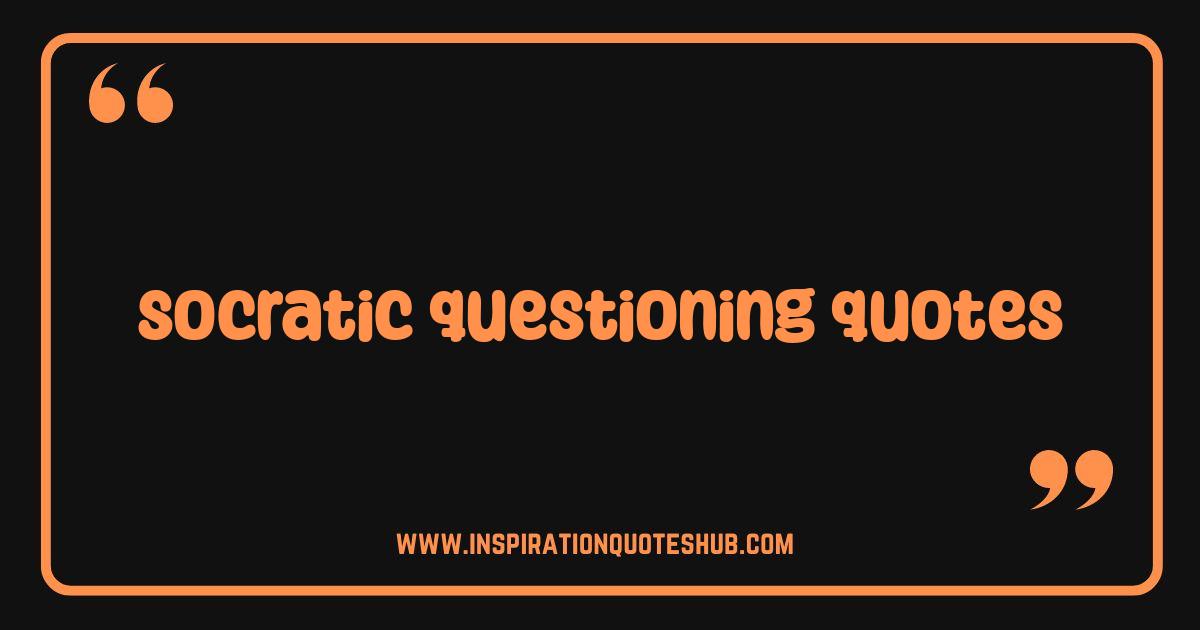
Dive into a collection of insightful Socratic questioning quotes that showcase the brilliance behind this timeless approach. Explore how these words of wisdom can transform your conversations, deepen your self-awareness, and empower you to seek truth.
Let’s explore some of the most impactful statements about Socratic questioning and its enduring relevance in today’s world.
Best Socratic Questioning Quotes: Ignite Curiosity and Critical Thinking
- “Unexamined assumptions are the weeds strangling the garden of truth.”
- “Socratic questioning: a gentle nudge toward self-discovery.”
- “The most potent answers often lie dormant within the questions we dare to ask.”
- “Don’t just accept; interrogate. The truth rewards the persistent inquirer.”
- “Socratic inquiry: the art of giving birth to understanding.”
- “Questioning is not doubt; it is a pathway to deeper conviction.”
- “True wisdom begins not with knowing, but with knowing what you do not know, and daring to ask.”
- “Let your questions be the compass guiding you through the labyrinth of ignorance.”
- “A well-placed question can dismantle a fortress of false belief.”
- “Socratic questioning: a dance between ignorance and enlightenment, led by curiosity.”
- “The unasked question is a seed of potential wisdom, forever unsprouted.”
- “Challenge the premise, and the conclusion crumbles.”
- “Embrace the discomfort of not knowing; it is the fertile ground for new insights.”
- “Through relentless questioning, we sculpt clarity from the shapeless clay of assumptions.”
- “Socratic dialogue: a shared journey into the heart of meaning.”
- I know that I know nothing
- The unexamined life is not worth living
- Strong minds discuss ideas; average minds discuss events; weak minds discuss people
- Wisdom begins in wonder
- To find yourself, think for yourself
- Let him who would move the world first move himself
- An honest man is always a child
- The only true wisdom is in knowing you know nothing
- The mind is everything; what you think, you become
- I cannot teach anybody anything; I can only make them think
- Be kind, for everyone you meet is fighting a hard battle
- Question everything
- A life without inquiry is a life unlived
- Truth springs from argument among friends
- The greatest way to live with honor is to be what we pretend to be
- He who is not contented with what he has will not be contented with what he would like to have
- Speak so that I may see you
- Beware the barrenness of a busy life
- I would rather die having spoken after my manner, than speak in your manner and live
- A multitude of books distracts the mind
- Envy is the ulcer of the soul
- Knowledge is the food of the soul
- There is only one good, knowledge, and one evil, ignorance
- Understanding starts with a question, not an answer
- The more I learn, the more I realize how little I know
- True knowledge exists in knowing that you know nothing
- The only thing I know is that I know nothing
- Education is the kindling of a flame, not the filling of a vessel
- The hottest love has the coldest end
- He is richest who is content with the least
- We cannot live better than in seeking to become better
- Learning is a process of remembering
- Question what you know to discover what you don’t
- Wonder is the beginning of wisdom
- Those who truly understand are not afraid to question
- Every answer leads to a better question
- A wise man admits his ignorance
- You do not learn by answering questions, but by questioning answers
- Real learning starts when we stop pretending to know
- Ask not to win, but to understand
- Clarity comes through thoughtful inquiry
- Thoughtless acceptance is the enemy of truth
- The path to wisdom is paved with questions
- Good questions cut deeper than sharp answers
- Challenge your assumptions or be ruled by them
- Never stop asking why
- Truth fears no question
- To doubt is not weakness, but wisdom in disguise
- The soul grows when it is stretched by inquiry
- The most intelligent minds never stop asking
Socratic Questioning Quotes: Unveiling Wisdom
Socratic questioning quotes offer timeless wisdom, guiding us to think critically and challenge assumptions. They reveal the power of inquiry, prompting self-reflection and deeper understanding. By embracing these thought-provoking words, we can unlock intellectual potential, refine our beliefs, and ultimately, unveil our own personal wisdom.
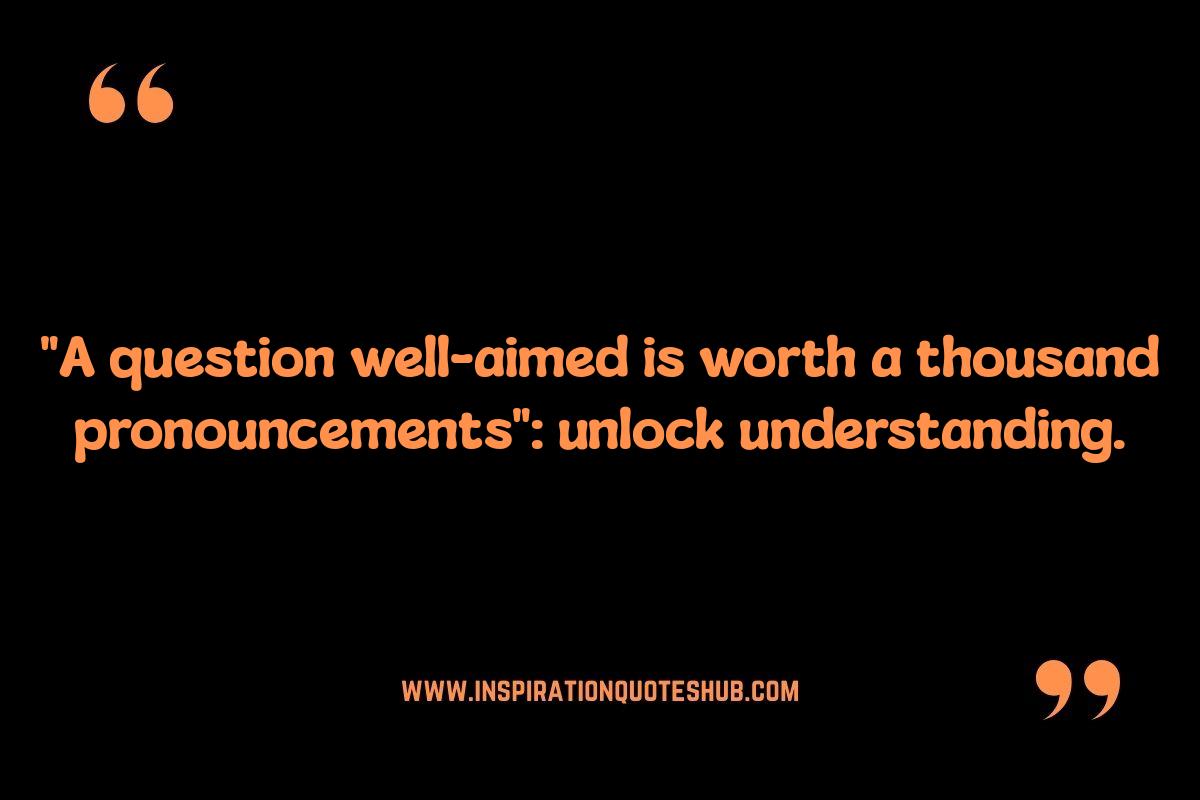
- “A question well-aimed is worth a thousand pronouncements”: unlock understanding.
- “Turn every conversation into an exploration: question, seek, discover.”
- “Socratic questioning: the art of gentle prodding to unearth profound truths.”
- “True wisdom isn’t found in answers, but in the relentless pursuit of deeper questions.”
- “Let your curiosity be your guide: question assumptions, challenge beliefs, seek clarity.”
- “The Socratic method: a dialogue of discovery, a dance of intellects, a journey towards truth.”
- “Good questioning is better than knowing all the answers.”: open intellectual doors
- “Socratic discourse: where ignorance confesses and wisdom is born.”
- “The unasked question is a potential revolution; dare to ignite the spark of inquiry.”
- “Question your assumptions: they are the gatekeepers of your understanding.”
- “Socratic inquiry: the art of dismantling falsehoods with precisely placed questions.”
- “A well-crafted question is a seed of wisdom, waiting to sprout in fertile minds.”
- “Use questions as your scalpel, dissecting complexity to reveal underlying clarity.”
- “Socratic questioning: an invitation to think, a challenge to believe, a path to understanding.”
- “The power of a question lies not in its answer, but in the journey it ignites within the mind.”
Socratic Questioning Quotes: Power of Inquiry
Socratic questioning, a powerful tool, ignites critical thinking. Quotes from Socrates himself and those inspired by him reveal its magic. They highlight how skillful questioning, not lecturing, unveils assumptions and biases. By probing deeper, we discover truth and clarity, fostering genuine understanding in ourselves and others. Explore the power of…

- “The Socratic method: where ignorance becomes a springboard to illumination.”
- “Questioning is the hammer that shatters the chains of unexamined belief.”
- “Through relentless inquiry, we excavate truth from the depths of assumption.”
- “Socratic questioning: a midwifery of the mind, assisting in the birth of understanding.”
- “The unasked question is a door unopened; dare to explore the rooms beyond.”
- “True wisdom isn’t found in knowing the answers, but in skillfully crafting the questions.”
- “Socratic inquiry: a collaborative dance where ignorance confesses and wisdom emerges.”
- “Let your questions be the compass guiding you through the labyrinth of uncertainty.”
- “The art of questioning is the art of empowering others to think for themselves.”
- “Socratic questioning: a gentle nudge towards self-awareness, a powerful force for change.”
- “A well-aimed question is a surgeon’s scalpel, precisely dissecting complexity.”
- “Socratic dialogue: a shared exploration of ideas, where every voice contributes to the symphony of understanding.”
- “Questioning your assumptions is the first step towards intellectual liberation.”
- “The Socratic method: a catalyst for critical thinking, a pathway to profound insight.”
- “True learning begins when we admit what we don’t know and embark on a quest for understanding.”
Socratic Questioning Quotes: Applications in Education
Socratic questioning, fueled by insightful quotes, remains a powerful educational tool. It’s not about lecturing, but guiding students to uncover knowledge themselves. Think of Socrates’ famous lines encouraging critical thinking. By posing thought-provoking questions, educators empower students to analyze assumptions, explore perspectives, and ultimately, build deeper understanding. It’s learning through…
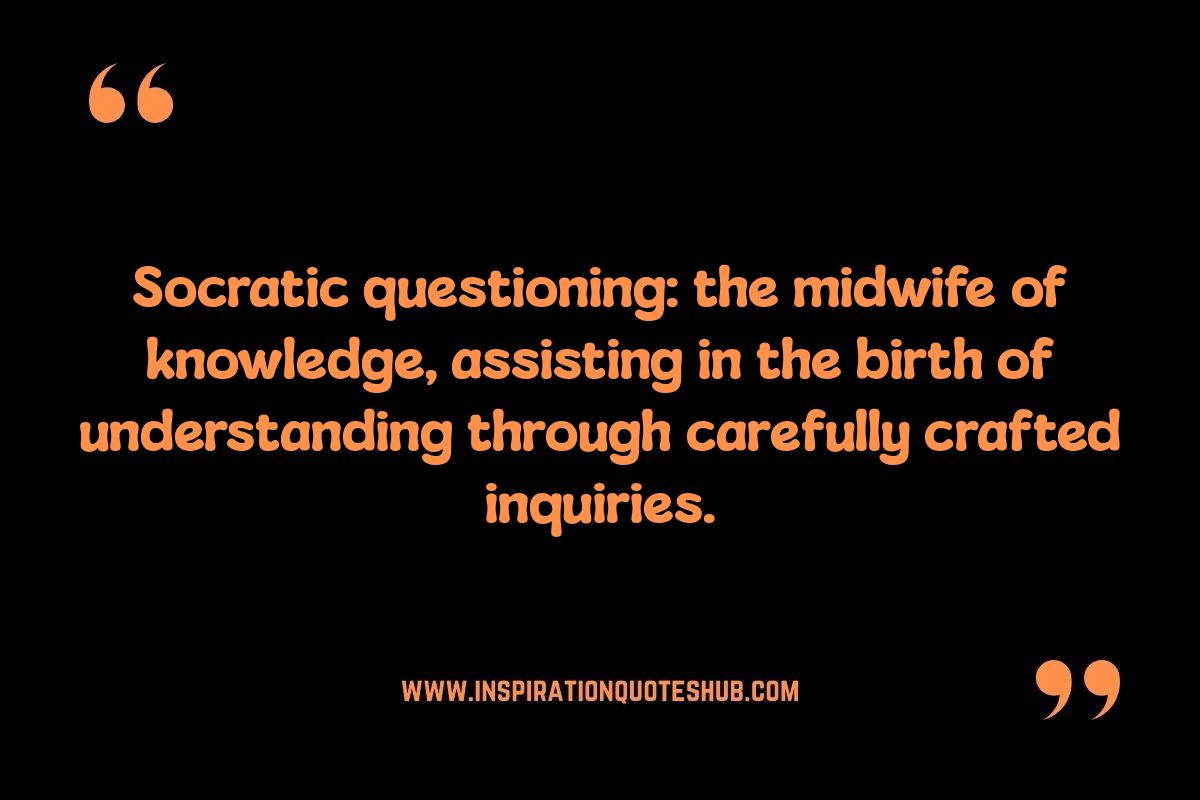
- Socratic questioning: the midwife of knowledge, assisting in the birth of understanding through carefully crafted inquiries.
- “Why” unlocks understanding; Socratic questioning is the key.
- The unasked question is an opportunity missed: Socratic inquiry ensures no stone is left unturned.
- Socratic questioning: turning assumptions into avenues for exploration.
- Guide students to knowledge, don’t spoon-feed: Socratic questioning empowers self-discovery.
- “Tell me more…”: the Socratic gateway to deeper understanding.
- Socratic questioning: cultivating critical thinkers, one question at a time.
- Transforming classrooms into collaborative think tanks through the power of Socratic dialogue.
- Socratic questioning: the art of gentle prodding to unearth profound truths within.
- “What if?” is a powerful tool in Socratic inquiry: encouraging imagination and innovation.
- Socratic questioning: where every answer sparks a new line of inquiry, fostering endless learning.
- Socratic questioning: a teaching method that values understanding over memorization.
- “How do you know?” challenges assumptions and promotes evidence-based thinking: Socratic questioning at its finest.
- Socratic questioning: not about finding the right answer, but about refining the thinking process.
- Empowering students to question everything: the essence of Socratic education.
Socratic Questioning Quotes: Ethical Considerations
Socratic questioning, though powerful for uncovering truth, demands ethical awareness. Quotes highlighting its use reveal potential pitfalls. Are we guiding, not manipulating? Is the learner truly free to think, or pressured by our line of questioning? Reflection on intent and impact ensures Socratic dialogue fosters genuine understanding, not intellectual dominance.
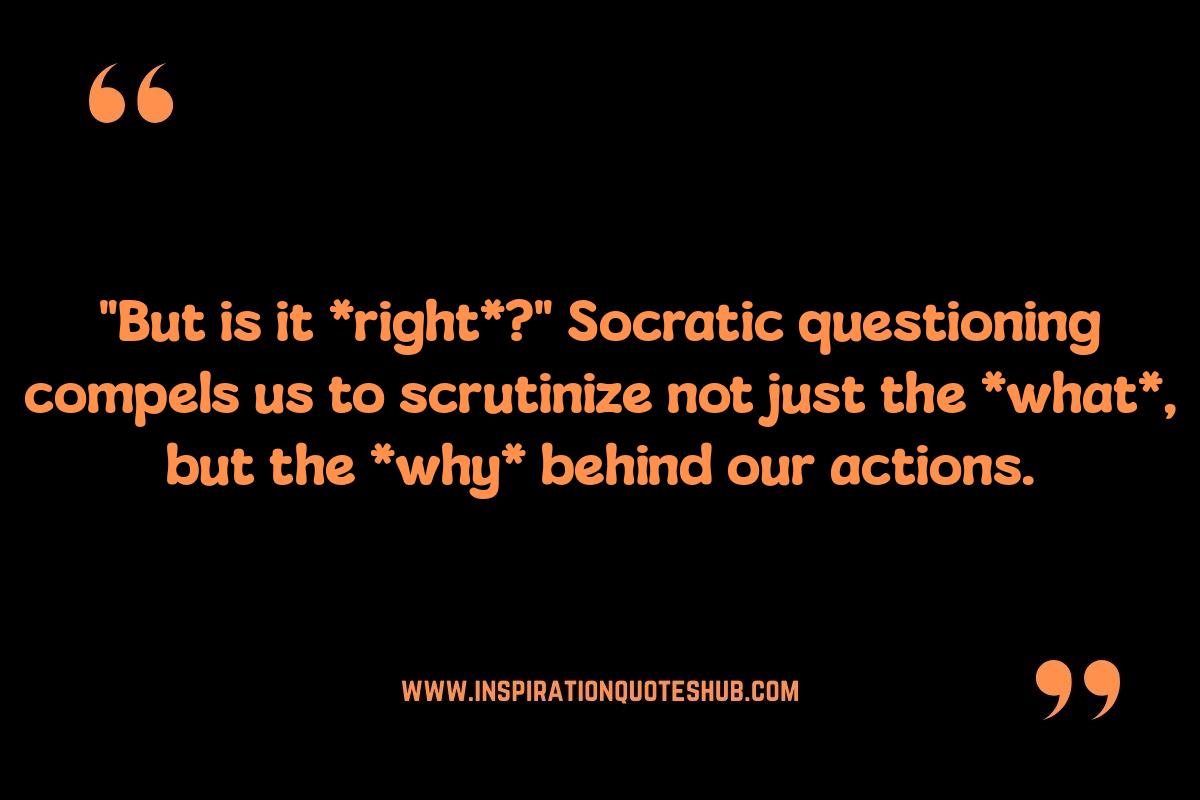
- “But is it *right*?” Socratic questioning compels us to scrutinize not just the *what*, but the *why* behind our actions.
- Ethical inquiry begins with relentless self-questioning: “What are the consequences of my beliefs?”
- The Socratic method: a moral compass guiding us through the murky waters of ethical dilemmas.
- “Whose interests are truly being served?” Ethical Socratic questioning demands a critical examination of power dynamics.
- Ethical action isn’t just about avoiding harm, but actively pursuing what is good, just, and fair: a question for the ages.
- Socratic questioning asks: “Is this action truly virtuous, or merely self-serving in disguise?”
- “What are the unspoken assumptions underlying this ethical stance?” Unearthing hidden biases through careful questioning.
- “Does this action align with my deepest values, or am I compromising my integrity?” The heart of ethical self-reflection.
- Socratic questioning: a powerful tool, but one that demands humility, empathy, and a genuine commitment to ethical truth.
- “If everyone acted this way, what would the world look like?” A Socratic lens for assessing the universality of ethical principles.
- Ethical Socratic questioning: a journey, not a destination, demanding constant vigilance and self-critique.
- “Am I truly listening to understand, or simply waiting for my turn to speak?” The ethical imperative of genuine dialogue.
- “What are the potential unintended consequences of this seemingly ethical decision?” Considering the broader impact.
- Socratic questioning: a path towards ethical clarity, demanding that we confront our own moral blind spots.
- “How can I ensure that my actions are guided by compassion and fairness, even when it’s difficult?” The ultimate ethical challenge.
Socratic Questioning Quotes: Fostering Critical Thinking
Socratic questioning quotes offer timeless wisdom for sparking critical thinking. These aren’t just fancy sayings; they’re invitations to dig deeper, challenge assumptions, and arrive at your own understanding. Explore the power of insightful questions, learn to dissect complex ideas, and cultivate a more thoughtful approach to life’s challenges using the…
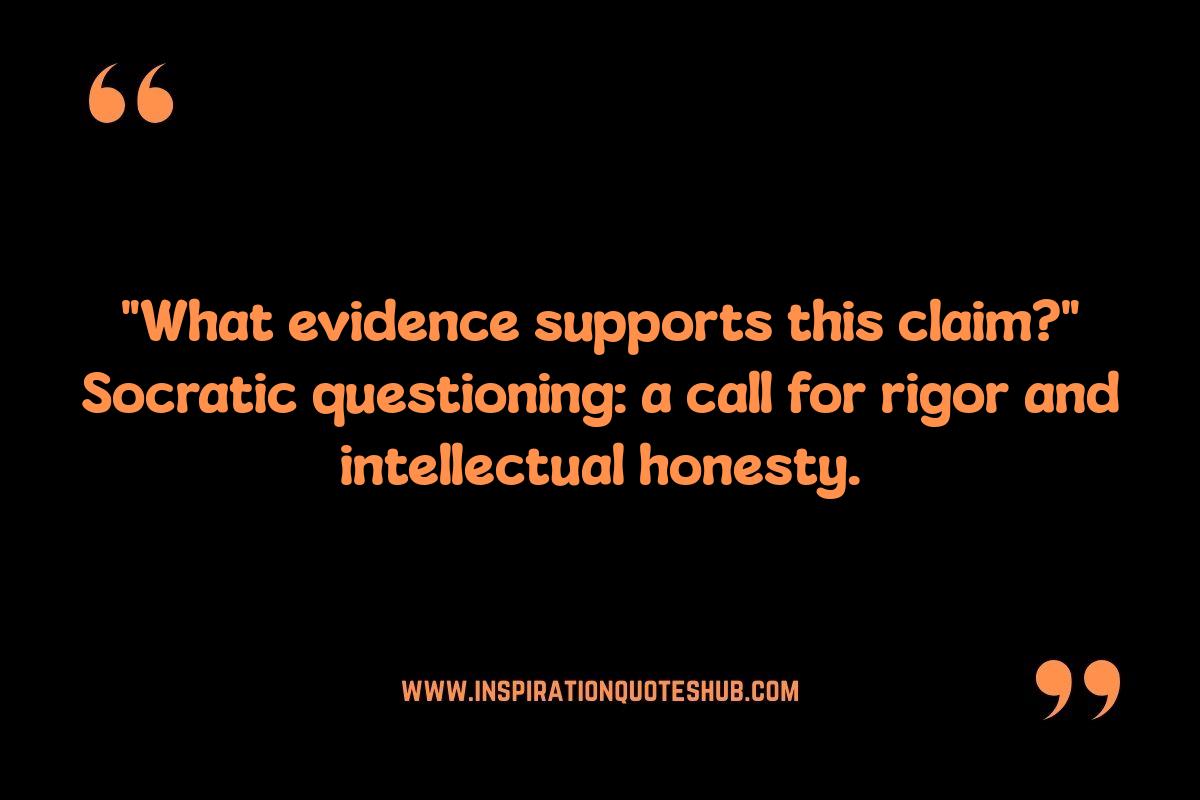
- “What evidence supports this claim?” Socratic questioning: a call for rigor and intellectual honesty.
- “Why do you believe that to be true?”: Socratic questioning: challenging assumptions and fostering clarity.
- “What alternative perspectives exist?” Socratic questioning invites empathy and comprehensive understanding.
- “If that were true, what would be the logical implications?”: Socratic questioning: unveiling consequences and fostering critical analysis.
- “Is there another way to look at this?”: Socratic questioning encourages multiple perspectives and open-mindedness.
- “Could you elaborate on that point?”: Socratic questioning clarifies understanding and fosters deeper exploration.
- “What are the strengths and weaknesses of this argument?”: Socratic questioning: balanced assessment for informed decisions.
- “How does this connect to what we already know?”: Socratic questioning: building bridges between new information and existing knowledge.
- “What assumptions are we making, and are they valid?”: Socratic questioning: questioning the unquestioned.
- “What if our initial assumption is wrong?”: Socratic questioning: embracing the possibility of error and fostering intellectual humility.
- “What are the potential long-term effects of this decision?”: Socratic questioning: considering consequences beyond the immediate.
- “Can you give me an example?”: Socratic questioning: grounding abstract concepts in concrete realities.
- “What would be the counter-argument?”: Socratic questioning: playing devil’s advocate to strengthen understanding.
- “How could we verify that claim?”: Socratic questioning: promoting empirical thinking and evidence-based reasoning.
- “What are the underlying values driving this belief?”: Socratic questioning: revealing the ethical foundations of thought.
Socratic Questioning Quotes: Impact on Self-Discovery
Socratic questioning quotes offer more than just words; they’re tools for self-excavation. By prompting deeper reflection on assumptions and beliefs, these quotes unlock hidden layers of understanding. They challenge us to examine our own reasoning, fostering critical thinking and ultimately paving the path towards authentic self-discovery.
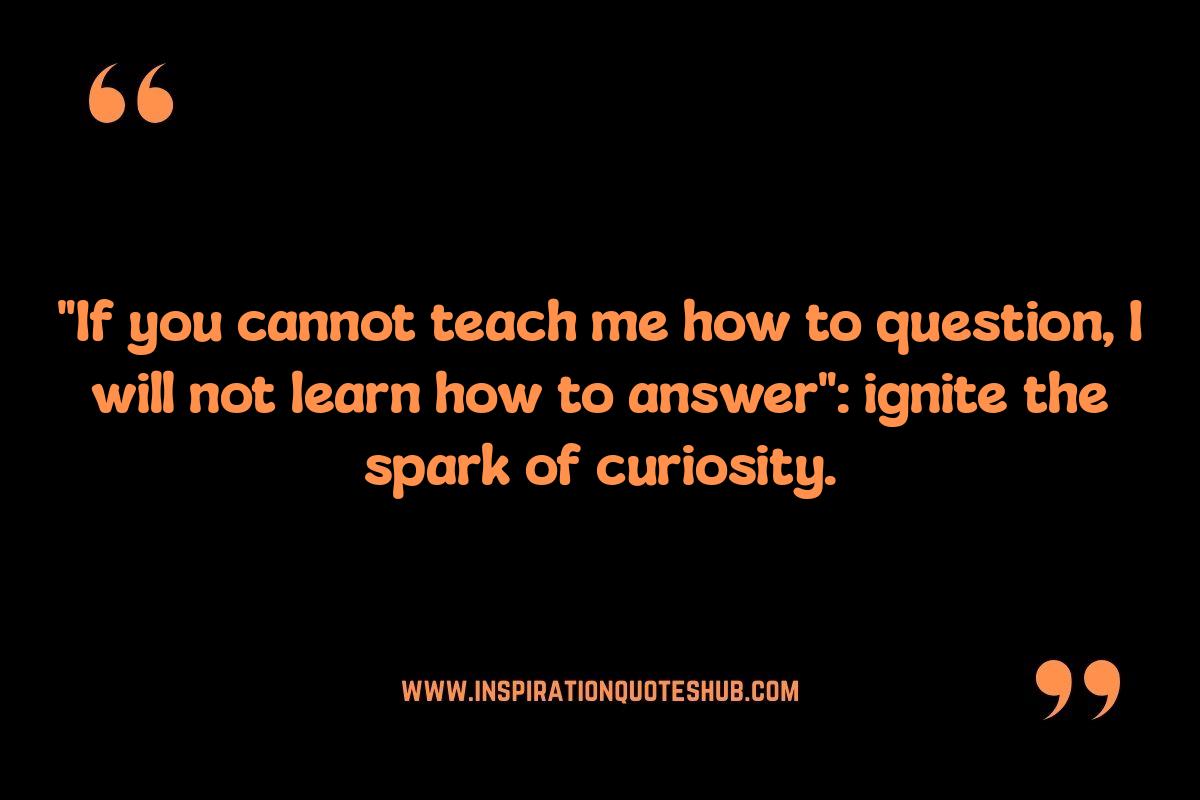
- “If you cannot teach me how to question, I will not learn how to answer”: ignite the spark of curiosity.
- Socratic questioning: the art of intellectual humility, acknowledging the vastness of what remains unknown.
- “What are the hidden costs we’re not considering?”: ethical Socratic questioning, revealing the subtle pitfalls of decision-making.
- Doubt well-directed can be more valuable than unquestioned certainty: use it as a tool.
- “How does this align with our core values?”: Socratic questioning: anchoring decisions in ethical principles.
- The unasked ‘why’ is the silent killer of progress: never stop questioning the status quo.
- “What evidence would *disprove* your claim?”: Socratic questioning: the pursuit of truth demands rigorous self-assessment.
- “If this holds true, what are the implications for future generations?”: Socratic questioning: ethical responsibility extends beyond the present.
- “What are the potential biases influencing our perspective?”: Socratic questioning: the pursuit of objectivity begins with self-awareness.
- “If our assumptions are wrong, what are the alternative solutions?”: Socratic questioning: embrace creativity.
- Socratic questioning is not about winning the argument, but illuminating the path.
- “What is the counterargument?” Questioning assumptions to arrive at a holistic understanding
- “How might someone with a different background view this situation?”: Socratic questioning: cultivate empathy and understanding.
- “What are the ethical implications if we fail?”: Socratic questioning: a reminder of the weight of responsibility.
- “If we prioritize short-term gains, what will be the long-term consequences?”: Socratic questioning: think long-term.
Socratic Questioning Quotes: Ancient Roots, Modern Relevance
Socratic questioning, born in ancient Greece, remains powerfully relevant today. Quotes from Socrates himself offer timeless wisdom on critical thinking and self-discovery. These aren’t just historical musings; they’re practical tools for deeper understanding, effective communication, and challenging assumptions in our modern world. Engage with them and unlock your own potential…
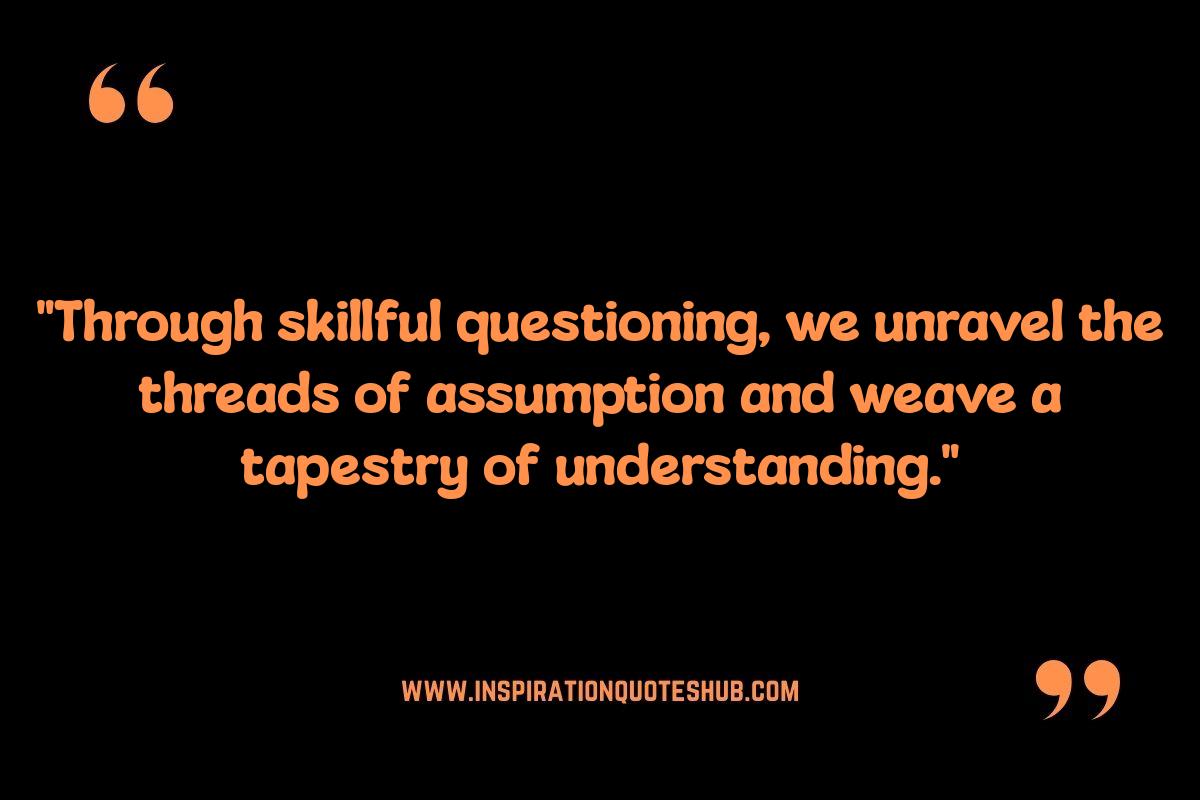
- “Through skillful questioning, we unravel the threads of assumption and weave a tapestry of understanding.”
- “The Socratic method: a journey of collaborative inquiry, where every question illuminates the path.”
- “A question is a lever that moves the world of understanding.”
- “Unearth hidden wisdom through persistent, probing inquiries.”
- “Socratic questioning: The art of intellectual midwifery.”
- “Turn ignorance into a quest for knowledge with carefully crafted questions.”
- “Questions are the compass guiding us through the labyrinth of the unknown.”
- “The goal of Socratic questioning is not to win, but to understand.”
- “Good questions challenge, good answers enlighten.”
- “Socratic questioning: the midwife of understanding.”
- “Inquiry is the seed from which the tree of knowledge grows.”
- “Socratic questioning: a catalyst for clarity.”
- “The unasked question is a gateway unexplored.”
- “Transform assumptions into avenues of exploration through skillful questioning.”
- “Socratic questioning: from doubt to discovery.”
Socratic Questioning Quotes: Avoiding Manipulation
Socratic questioning isn’t just about asking questions; it’s about fostering genuine understanding. But be wary! Quotes emphasizing manipulation highlight how easily this method can be twisted. True Socratic dialogue aims for truth, not to trap or control. Use these powerful questions ethically, focusing on collaborative discovery, not veiled persuasion.
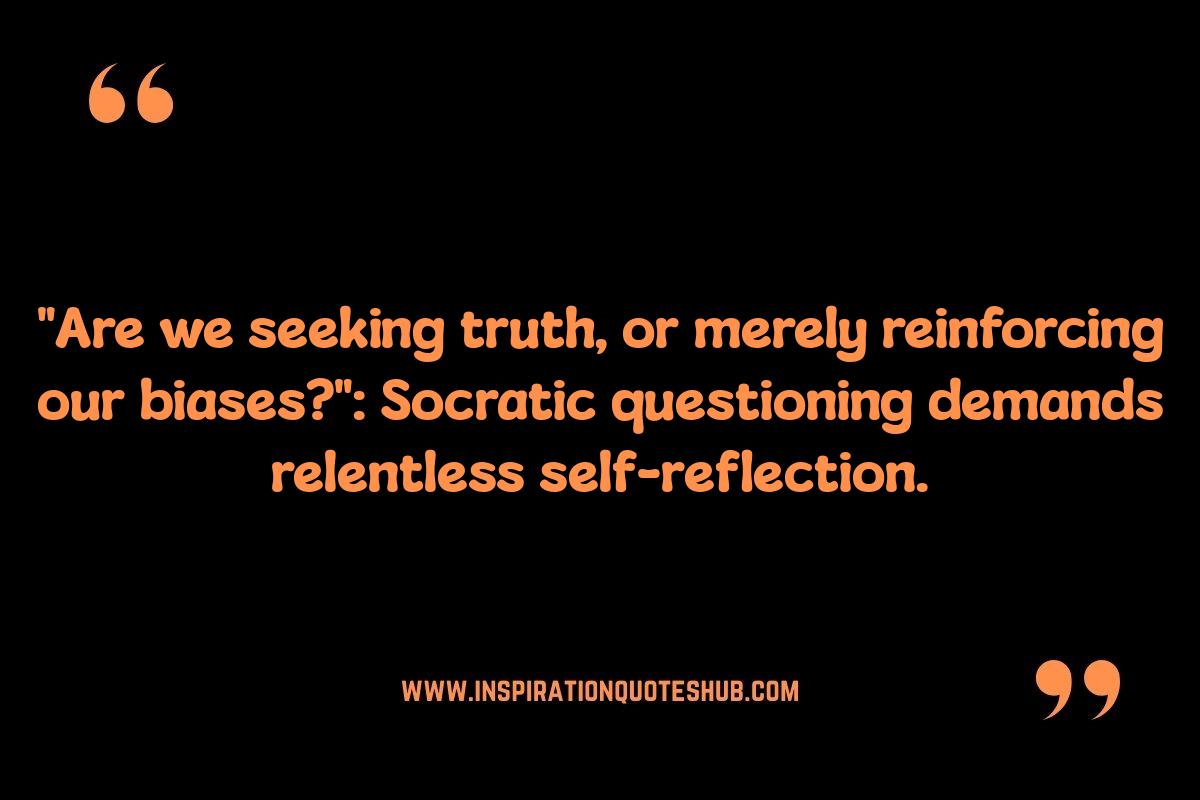
- “Are we seeking truth, or merely reinforcing our biases?”: Socratic questioning demands relentless self-reflection.
- “Before assuming malice, consider ignorance. Before assuming ignorance, consider bias.”: Questioning motives.
- “If our beliefs are so fragile they can’t withstand scrutiny, are they worth holding?”: Questioning for robustness.
- Socratic questioning: Disarming manipulation by demanding clarity and revealing hidden agendas.
- “What evidence would convince you to change your mind?”: A test of intellectual honesty in Socratic inquiry.
- “Is this truly the only possible interpretation?”: Challenging narratives.
- “By whose authority is this proclaimed, and what are their credentials?”: Questioning authority figures.
- “What are the potential benefits and harms, and who bears them?”: Assessing ethical implications.
- Socratic questioning: Turning persuasive rhetoric into a quest for genuine understanding and ethical clarity.
- “Is fear clouding our judgment?”: Addressing emotional manipulation.
- “What vested interests might be at play?”: Unmasking hidden motives.
- “What are the unstated assumptions behind this argument?”: Exposing the foundation.
- “If this claim is true, what actions does it compel us to take, and are those actions justifiable?”: Examining implications.
- “How can we verify the accuracy of this information, beyond simply trusting the source?”: Emphasizing verification.
- Socratic questioning: A shield against manipulation, forged in the fires of critical thought.






